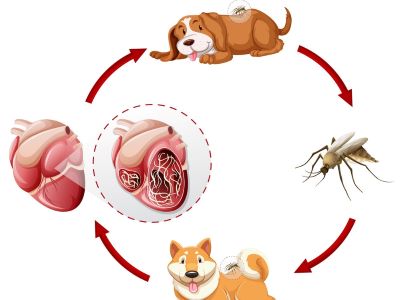Heart worms in dogs are transmitted by a blood-borne parasite known as dirofilaria immitis and live in the heart and lungs of the infected animals, where they cause inflammation, damage and failure of these organs.
Heart worm disease can also affect other parts of the body, such as the kidneys, liver and brain. Millions of dogs worldwide suffer from the heart worm illness each year.

The American Heartworm Society claims that heart worm illness has been documented in all 50 U.S. states as well as several other nations worldwide.
In this blog, we will give you the information about what causes heart worms in dogs? Also we will try to cover how to prevent and treat heart worm disease in dogs? by sharing tips to protect dogs from heart worm disease.
Contents
Causes of Heart worms in Dogs
One of the most important things to understand about heart worm disease is how dogs get infected by a blood-borne parasite called Dirofilaria immitis.[1]
Knowing the life cycle of heart worms and how they are transmitted by mosquitoes can help you prevent and treat this disease effectively.
1). The Life Cycle of Heart Worms in Dogs
The life cycle of heart worms involves two hosts: a mosquito and a dog (or another animal). The cycle begins when an adult female heart worm releases young microfilariae (tiny worms) into the bloodstream of an infected animal.
These microfilariae circulate in the blood and wait for a mosquito to pick them up. When a mosquito bites an infected animal, it ingests some of the microfilariae along with the blood.

The microfilariae then develop into infective larvae inside the mosquito over a period of 10 to 14 days. The mosquito then transfers the larvae to another animal when it bites again.
The larvae enter the new host through the bite wound and travel through the bloodstream to the heart and lungs, where they grow into adult worms. This process takes about six months.
The adult worms can live for 5 to 7 years in dogs and up to 2 or 3 years in cats. They can reach up to a foot in length and produce hundreds of offspring during their lifespan.
The offspring, or microfilariae, can then be picked up by another mosquito and continue the cycle.
2). The Factors that Increase the Risk of Infection
Climate, season, location, and mosquito exposure are only a few of the variables that affect the risk of sickness. As mosquitoes flourish in warm, humid climates, heart worm infection is more common there.
The season for mosquitoes, which varies based on the place, is also when it is more common. Mosquitoes are more likely to attack dogs who stay close to water or heavily wooded areas.
Moreover, dogs that travel often or spend a lot of time outside are also at higher risk.
Other factors that increase the risk of infection include the presence of wild or stray animals that can act as reservoirs of the parasite, such as foxes, coyotes and wolves.
Also, pets that are not on preventive medication or have missed doses are more vulnerable to infection.
3). The Signs and Symptoms of Heart Worm Infection in Dogs
The signs and symptoms of heart worm infection in dogs may vary depending on the number and location of the worms, the duration of infection and the immune response of the dog.

Some dogs may not show any signs until the disease is advanced. Therefore, it is important to test your dog regularly for heart worms and use preventive medication.
Some of the common signs and symptoms of heart worm infection in dogs include:
- Coughing
- Difficulty breathing
- Fatigue
- Weight loss
- Loss of appetite
- Swollen abdomen
- Fainting
- Collapse
- Heart failure
If you notice any of these signs in your dog, you should contact your veterinarian as soon as possible. Early diagnosis and treatment can save your dog’s life and prevent further damage to their health.
How to Prevent and Treat Heart Worm Disease in Dogs?
Preventing heart worm infection in the first place is the best strategy to handle the condition. Compared to medication, prevention is safer, simpler, and less expensive.[2]
There are, however, therapeutic options available if you found heart worms in dogs, which may be able to preserve their life and improve their health.
In this section, we’ll go over the value of routine examinations and preventative medicine for dogs, evaluate the efficacy of various preventive product types, describe the many alternatives for treating dogs with heart worm disease, and underline any treatment-related risks and expenses.
1). The Treatment Options and Procedures for Dogs
If your dog tests positive for heart worms, you should not panic. There are treatments available that can kill the adult worms and prevent further damage to your dog’s health.
However, treatment can be costly and complicated, and it may involve multiple visits to the vet, injections, medications and strict rest for your dog.

Treatment can also cause side effects and complications, such as allergic reactions, blood clots and infections. Therefore, prevention is always better than cure.
The treatment options and procedures for dogs with heart worm disease depend on several factors, such as the severity of infection, the age and health of the dog, the availability of resources and the preference of the veterinarian.
Here are some of the common steps involved in treating heart worm disease in dogs:
a) Confirming the diagnosis: Your veterinarian will perform blood and imaging tests to confirm that your dog has heart worm disease and assess the severity of infection and damage.
b) Stabilizing the condition: Your veterinarian will provide supportive care to your dog if they have severe symptoms or complications from heart worm disease, such as oxygen therapy, fluids or surgery.
c) Killing the adult worms: Your veterinarian will give your dog injections of a drug called melarsomine dihydrochloride to kill the adult worms in their heart and lungs. This drug may cause pain, fever or other side effects in some dogs.[3]
d) Killing the microfilariae: Your veterinarian will give your dog a preventive product to kill the microfilariae (the offspring of the adult worms) in their blood. This is important to prevent reinfection and transmission.
Some preventive products may cause vomiting, diarrhea or shock in some dogs.
e) Restricting exercise: Your veterinarian will advise you to limit your dog’s exercise and activity during and after treatment to prevent worsening the damage and complications from the dying worms.
You should keep your dog calm and quiet until they recover fully.
f) Monitoring progress: Your veterinarian will monitor your dog’s progress by performing regular tests and checkups. These will help evaluate your dog’s response to treatment, check for any problems, and confirm that all the worms have been killed.
Your veterinarian will also advise you on how to prevent reinfection and protect your dog’s health in the future.
2). The Potential Complications and Costs of Treatment
Treating heart worm disease in dogs can be challenging and risky. There are several potential complications that can occur during or after treatment, such as:
a) Allergic reactions: Some dogs may have allergic reactions to the drugs used to kill the adult worms or microfilariae. These reactions can range from mild to severe and can include hives, itching, swelling, vomiting, diarrhea, difficulty breathing or shock.

b) Blood clots: As the adult worms die, they can break into pieces and form blood clots that can block the blood vessels in the lungs. This can cause pulmonary embolism, which can lead to respiratory distress, coughing up blood, collapse or death.
c) Infections: The dying worms can also release bacteria into the bloodstream that can cause infections in different organs. These infections can cause fever, inflammation, abscesses or septicemia (blood poisoning).
d) Kidney damage: The drugs used to kill the adult worms or microfilariae can be toxic to the kidneys and cause kidney damage or failure in some dogs. This can lead to increased thirst, increased urination, decreased appetite, weight loss or vomiting.
Treating heart worm disease in dogs can also be costly. The cost of treatment depends on several factors.
Such as the severity of infection, the type of treatment protocol, the type of preventive product used, the number and type of tests performed and the location and availability of the veterinary clinic.[4]
According to The American Heartworm Society, the average cost of heartworm treatment for dogs in the U.S. is about $1,000. However, this cost can vary widely depending on the individual case and the region.
In contrast, the average cost of heartworm prevention for dogs in the U.S. is about $5 to $15 per month. Therefore, prevention is not only safer and easier, but also cheaper than treatment.
Tips to Prevent Heart Worms in Dogs

- Test your dog for heart worms every 12 months, even if they are on preventive medication.
- Use a preventive product that is suitable for your dog’s needs and lifestyle, and follow the label directions carefully.
- Keep your dog on preventive medication year-round, even if you live in an area where heart worm disease is not common.
- Restrict your dog’s exercise and activity during and after treatment if they are diagnosed with heart worm disease.
- Monitor your dog’s progress and health throughout and after treatment by visiting your veterinarian regularly.
- Avoid areas where mosquitoes are abundant or use repellents or barriers to protect your dog from mosquito bites.
- Keep your home and yard mosquito-free by eliminating stagnant water sources and using insecticides or traps.
FAQs
What are the first signs of heartworms in dogs?
The first signs of heartworms in dogs are coughing, difficulty breathing, fatigue, weight loss, loss of appetite, swollen abdomen, fainting, collapse and heart failure. However, some dogs may not show any signs until it is too late.
Can heartworms in dogs be cured?
Heartworms in dogs can be treated, but not cured. Treatment is costly and risky, and it may not reverse all the damage. Treatment can also cause side effects and complications.
How can you prevent heartworms in dogs?
You can prevent heartworms in dogs by using a preventive product that kills the larvae before they become adult worms. You should consult your veterinarian about the best option for your dog and follow their instructions carefully.
How long can a dog live with heartworms?
The lifespan of a dog with heartworms depends on several factors, but it is not a healthy or safe condition. Heartworms can cause lasting damage to the heart, lungs and arteries, and can affect the dog’s health and quality of life long after the parasites are gone. Some dogs may die suddenly or suffer from severe or fatal complications from heartworm disease.
Conclusion
Heartworm disease is a serious and potentially fatal condition that affects dogs and other animals. It is caused by a a blood-borne parasitic nematode (roundworm) known as Dirofilaria immitis transmitted by mosquitoes and lives in the heart and lungs of infected animals.
Prevention is the best way to protect your pets from heart worm disease, but treatment is also available if needed. Heart worm disease can affect other animals and humans as well, so be aware and take precautions.
We hope this article has helped you to understand what causes heart worms in dogs, how to prevent and treat them, and why they are a growing concern for pet owners.
If you have any questions or concerns about heart worms in dogs, do not hesitate to contact us today. We will be happy to help you keep your dog healthy and happy. Remember, Prevention is better than cure!
References:
- Heartworm disease. (2023, January 9). Retrieved June 15, 2023, from- Cornell University
- Center for Veterinary Medicine. (2022). Keep the Worms Out of Your Pet’s Heart! The Facts about Heartworm Disease. U.S. Food And Drug Administration.- FDA
- IMMITICIDE® Sterile Powder (melarsomine dihydrochloride). (n.d.). Retrieved June 15, 2023, from- DailyMed
- Heartworm Guidelines. (2001, April 11). American Heartworm Society. Retrieved June 15, 2023, from- AHS

Dania is a dog groomer living in California, who loves styling dogs. She often uses dog accessories to keep them distracted while grooming. She is also a dog parent to a Pomeranian, Duke. It’s because of him she is always on a lookout for the best dog foods, toys, other dog accessories, and ways to keep him equipped, healthy and happy.

